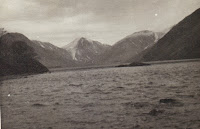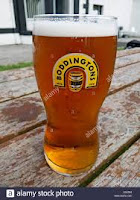Another tale that I
can tell goes back to my early childhood and centres around my use of my
bicycle, rather two bicycles.
A fixed-wheel
jobbie for short trips to the beach and around the small town of my residence,
Cleveleys, to do the shopping for my Nan & Pop, and my drop-handle-barred
and ten geared-racer for longer trips to the Pennines, Pilling-Sands, Glasson
Dock and the Lake District.
The latter area
was visited when I scaled the highest mountain in England, Scarfell Pike. However,
the trip was not done on bicycles but by car.
A Ford Zodiac,
more of that later.
It was in the
early sixties and I was about seventeen at the time. Scarfell Pike is located in
the Lake District National Park, in Cumbria and has an elevation of 978 metres (3,209 ft) above sea
level.
This is how it looked from the bottom,
with Wastwater Lake in the foreground.
Please excuse the photographs taken on
this venture. They were recorded on my then newly acquired as a birthday
present camera, a Brownie 127 I think it was called.
Today Scarfell
Pike and its neighbour Scarfell are climbed regularly by hikers and tourists. I
am told that part of the trek is now paved and even wheelchairs can negotiate
some of the climb.
Back in the
sixties it was an adventure with a capital “A”, the climbing and conquering of
Scarfell Pike was then a quest, a mission. A major exploit for four young,
athletic and enterprising young lads, particularly as its peak was covered in
approximately three-foot of snow!
This is us at the
summit.
And a spectacular view
of its neighbour Scarfell just 3162ft, 47ft lower!
We
opted for the easiest ascent from Wastdale-Head village green, as there was a
secure area where we could park the car and the drive to the nearest
establishment that served alcohol was only five miles away.
I should perhaps
make it clear that when I say “Easy” I mean it’s easy relative to the other
routes; it’s an unrelenting climb and the crossing of Lingmell Gill can be
dangerous, particularly after rain, but with the freezing temperature and snow
on the ground, for us it was a doddle.
You will only have
to look up the number of call-outs the Wasdale mountain rescue service had in
the sixties to realise that navigation errors can lead to serious mishaps.
However, to us the rugged beauty, breath-taking grandeur made our ascent a
memorable experience that I still remember sixty-five odd years later.
We, Frank Holford,
Nigel Fisher, and myself were in our school’s cadet force so we had experience
with camping and had been involved in many orienteering expeditions when we
went on the cadet-force’s summer training camps, unfortunately Mick Dyson, the
fourth member of our team, did not have this experience or training. His major
asset was; he owned the car that transported us from the Fylde to Wastwater
Green.
It was the very
spacious 1962 Ford Zodiac.
The Zodiac was the luxury variant of The
Zephyr and were made by British Ford from 1950 till the early seventies, they
were the largest passenger car on the market and they guzzled petrol. Mick was
very fortunate in that his dad owned a Ford dealership in Blackpool, so a car
and fuel were no problem.
I befriended him in my second to last
year at school. As my school did not teach Geology as an O-level subject, my
headmaster arranged that I attend lessons at the nearby Blackpool Grammar
School, a fifteen-minute cycle ride from my school, Arnold Boys on Lytham Road
near the Pleasure Beach.
I cycled there
three times a week and struck up a friendship with Mick who was also studying
Geology and loved the locally produced bitter called Boddingtons.
After the final
geology lesson of the week on a Friday, Mick would drive down to Yates Wine
Lodge on the North Shore of Blackpool and order two pints of “Boddies” so that
my pint would be waiting on bar when I arrived fifteen minutes later, on my
bicycle.
Throughout those
final two years our friendship blossomed. Mick loved showing off his Zodiac and
was always keen to take new passengers, he was also not shy of sipping several
Boddies, so he was soon introduced to Frank and Nigel, fellow imbibers of the
smooth bitter.
I’m sorry, I
digress. I started inferring that I would write about my memories of my youth
involving a bicycle, but I have taken you up the highest mountain in England.
Then, bicycles
were usually the only means of transportation I had in my late teens, so
without either hitching, which I did annually down to London to be involved in
NYT productions, or scrounging a lift off Mick, I pedalled my way to many
obscure places within a twenty-five radius of my home.
Friday nights were
nearly always a pub-crawl or pub-pedal. My mate, Grid, his nickname for Chris
Gradwell. Grad-Grid, you get it? Well, almost. He had the misfortune to get his
head stuck in some iron railings while under the influence of some
Boddies-bitter, so the name Grid stuck.
Grid and I always
chose public houses that were well outside our small town, this involved a
pedal on our bicycles. We chose establishments that involved crossing the Wyre
river and took us to the villages of the Fylde like Poulton, Preesall, and
Pilling, this was about an hour’s cycle, and we passed through Thornton, Stannah,
Little Thornton, Hambleton, and Staimine and started our consumption of either
Boddies-bitter or a bottled stout like Guinness called Jubilee.
The pub in
Preesall is now called the Black Bull, its name then escapes me, perhaps The
Preesall Arms, but nowadays all the pubs as we knew them are gone. They all had
men’s-only bars, called public bars, they also had a small area for women only
called “snugs” and lounge bars were the sexes could intermingle. The public
bars were always equipped with a dart board, each pub having a resident dart’s
team. A few of them had pool tables and there were always several packs of
playing cards available for use in a game of snap, cribbage or even bridge.
Today all these
pubs, the communal meeting place, have been converted to up-market eating
establishments catering for the middle class and vehicularly mobile generation.
I remember on one occasion we avidly listened to the great Brain London,
a local Blackpudlian-boxer, getting pummelled by the invincible then Casius
Clay. It was scheduled for fifteen rounds,
but London was knocked out in the third round.
That night we bid a
hasty retreat to the Shard Inn which was close to the Wyre bridge for our third
pint. There was a toll fee to cross the bridge over the Wyre of two pence or
threepence. Once over the Wyre we stopped at the Lodge in Thornton, a quick
pint and then onto my favourite pub the Bay Horse at Thornton’s rail station.
This place had a snug,
a public bar and a lounge. Stools and benches in the public bar, benches and a
table in the small snug and Chippendale furniture in the lounge.
The ideal pub!
Fish and chips were
then the ideal ending to the evening jaunt and these were acquired back in the
Cleveleys town centre.
Here the bicycles
came into play as they were used to mount the pavement and ride directly up to
the counter, where the order was placed. Cod, chips and “Crosserlies”!
“Crosserlies” were all the discarded bits of chips and broken batter that accumulated
in the fryer, and Biff gave them away free.
Biff was the owner
of the Chippie called in those days, Abbots, because Biff’s surname was used;
he never once complained of us riding our bicycles into his chippie.
And always welcomed
our arrival with a cordial “‘allo there! Usual eh lads?”
Today apart from us
being arrested as juvenile delinquents, we would no longer find the chippie.
It was demolished
in the eighties and now a Thai restaurant is across the main Victoria Road.
Progress I suppose.
But that won’t get
in the way of many other bicycle adventures to Fleetwood, Royal Lytham St Annes
golf course, Garstang, and Glasson dock, some of which can be found by reading
earlier blogs. Enjoy, thanks.

















